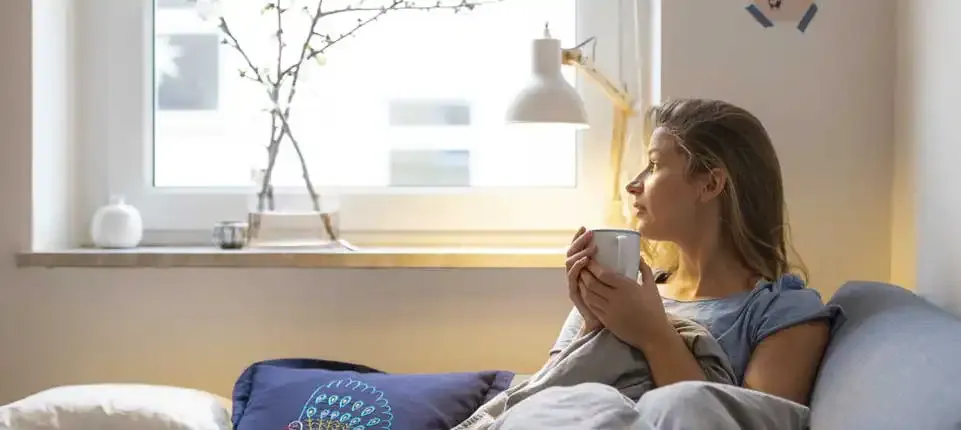February 21, 2023
What is hangxiety?

After a night out drinking you might wake up feeling anxious or worried about what happened the night before. This could include feeling on-edge or irritable and being unable to sleep or relax.
If this is you, you’re not alone - ‘hangxiety’ is a common post-drinking experience, along with physical hangover symptoms like a headache, nausea or trouble concentrating.1
Here we look at why this happens, and how it can be managed.
What causes hangxiety?
Hangxiety is partly caused by the chemical changes that take place in our brains when we drink.
Alcohol works on the brain’s GABA (gamma-aminobutyric acid) receptor – this is what makes you feel more relaxed when you start drinking.
As drinking continues, our brains also start to shut off glutamate (which makes you anxious), increasing feelings of calm and being uninhibited.2
But as alcohol starts to wear off, our brain tries to restore the normal chemical balance.
It does this by both reducing the brain’s GABA (lessening calm feelings) and increasing glutamate (making us feel more anxious). Together this has the opposite effect compared to when you were drinking and increases anxiety.2
It’s important to remember many of the anxious thoughts or feelings you might experience after drinking could be caused by the chemical changes in your brain.
Some of us experience worse post-drinking anxiety than others.
And we know people who already experience anxiety are more likely to experience hangxiety.2
How long does hanxiety last?
Hangover symptoms including anxiety tend to be most severe the day after drinking, when the body’s blood alcohol level returns to zero.
They can last for 24 hours or sometimes longer – depending on how much you had to drink and other physical factors, such as body size and liver health.3
There can also be a psychological element to hangxiety, as you may wake up stressed if you can’t remember what happened the night before.2
If you’re someone that experiences memory gaps from drinking, it’s a good idea to look at ways to reduce your alcohol consumption or reach out to one of the help and support services listed at the bottom of this article.
Can I prevent hangxiety?
You can reduce the likelihood of post-drinking anxiety by sticking to the Australian Guidelines to reduce risks from drinking, which recommends no more than 4 drinks in one day and no more than 10 in one week.4
And if you’re experiencing general anxiety or taking anti-depressant medication, try to avoid or limit alcohol. Make sure to check with your doctor or a pharmacist if any medications you’re taking interact with alcohol.
Generally, the more you drink the more intense your hangover symptoms, including anxiety, might be.
Some tips to slow down or reduce your drinking on a night out include:
- Have spacers – drink something non-alcoholic between drinks
- Finish your drink before a new one
- Sip not scull
- Water - drinks lots of it
- Use small glasses
- Eat before and during drinking – food can help slow down the effects of alcohol
- Stay off the spirits
- Slow drinking at your own pace, not trying to keep up with others
- Set limits on what and how much you’ll drink - know how much a standard drink is to help keep track
- No pressure, it’s OK to say no
Mixing other drugs with alcohol can also increase the risk of anxiety the next day. This is especially true for drugs that can cause anxiety when you’re coming down, such as MDMA, ketamine or cocaine.
It’s always safest to not take drugs, but if you plan on taking drugs get the facts beforehand – check out the Drug Facts page or Text The Effects.
How to deal with ‘hangxiety’
If you wake up with hangxiety, the first thing to do is remember to be kind to yourself.
Tips to help manage post drinking anxiety include:
- Get hydrated – drink water or something with electrolytes if you have it on hand.
- Eat something – even if you don’t feel hungry, eating something will help your brain and body recover.
- Rest up – whether it’s sleeping or just laying on the couch watching TV, take the time to rest.
- Distract yourself – watch your favorite show/movie or listen to a podcast. Choose something you find relaxing.
- Try mindfulness – try an app or free meditation online.
- Don’t drink more alcohol – this will likely just delay the anxiety.
- Avoid stimulant drugs – stimulants, including caffeine, tend to increase anxiety.
- Reach out to a friend – chatting to a good friend can help ease your mind. If you want to talk to someone anonymously there are also services available – see the list below.
Help and support
If you’re struggling with your drinking, there’s help available:
- visit Path2Help
- call the National Drug and Alcohol Hotline on 1800 250 015.
If you are experiencing ongoing feelings of anxiety you can:
- talk with your GP
- visit counselling online
- visit Beyond Blue or call 1300 22 4636 for support and information.
- Kaylor SK, Allen I, Townsend H, Rodgers J, Callihan ML. "Black out or back out": Understanding the alcohol habits, behaviors, and motivations of generation Z students. Journal of American College Health [Internet]. 2022 [08.02.2023]:[1-10 pp.].
- Marsh B, Carlyle M, Carter E, Hughes P, McGahey S, Lawn W, et al. Shyness, alcohol use disorders and ‘hangxiety’: A naturalistic study of social drinkers. Personality and Individual Differences [Internet]. 2019 [19.01.2023]; 139:[13-8 pp.].
- National Institute on Alcohol Abuse and Alcoholism. Hangovers 2021 [14.02.2023].
- National Health and Medical Research Council. Australian Guidelines to Reduce Health Risks from Drinking Alcohol. Canberra: Commonwealth of Australia; 2020 [08.02.2023].


